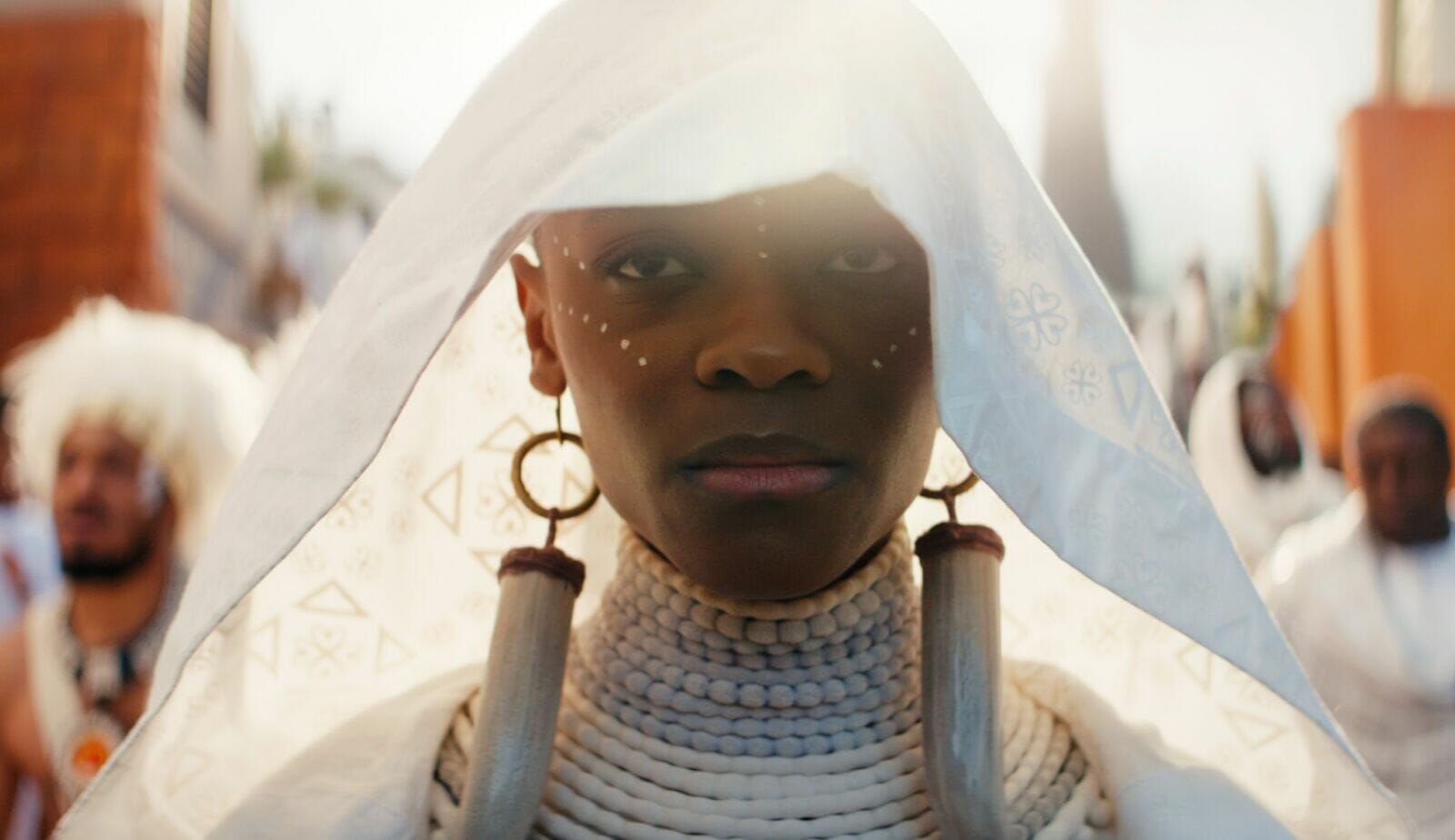Black Panther: Wakanda Forever is a funeral. In its opening moments, T’Challa’s sister Shuri (Letitia Wright) learns that a disease has taken her brother’s life, and the scene’s eerie, matter-of-fact quiet evokes the wake of Chadwick Boseman’s death, a colossal loss for the industry and culture. But Shuri is also walled in by fakey VFX and an unconvincing set, emitting an air of cheapness unbecoming of the tribute and reminding us that this isn’t just a funeral—it’s also, in the grand arc of the Marvel machine, a theme park attraction.
That’s not to say it’s disrespectful. When Wakanda Forever confronts Boseman’s loss head-on, it’s as poignant, honest, and distinct as one of these Disney projects can be. And, thankfully, the Afrofuturist aesthetics of the original Black Panther are (mostly) intact from the soundtrack and score to the production and costume design, this time alongside Latino and Mesoamerican influences tied to new sorta-villain Namor (Tenoch Huerta). The more expansive narrative limits Wakanda’s screen time, cordoning it to halls of techy walls and a recurring city hub, but the film otherwise honors Black Panther’s and Boseman’s legacies.
READ ALSO: Read all of Ryan Bordow’s movie reviews here
READ ALSO: New Rob Schneider film ‘Daddy Daughter Trip’ is a love letter to Arizona
It also, regrettably, retains its predecessor’s timidity. Although the original was atypically bold for a superhero blockbuster, it still shied away from its own politics. Killmonger was arguably righteous in his mission to “arm oppressed people all over the world so they can finally rise up” against colonizers and those in power, begging the question of the validity of violence in social change—but such a question is anathema to broadly-friendly Disney, so they had Killmonger vow in the same breath to slaughter the children of the oppressors too. There’s our punishable bad guy. Hollywood makes the righteous radical a villain by turning their advocacy into a crusade, thus choosing the peaceful status quo of perpetually incremental change; Black Panther couldn’t avoid this, and Wakanda Forever doesn’t either.
Huerta’s Namor leads the hidden, underwater society of Talokan, which major nations are on the brink of discovering due to its detectable stores of vibranium. In response, Namor asks Wakanda to help protect Talokan’s resources from inevitable exploitation—and by “asks for help,” I mean that he threatens to destroy Wakanda if they don’t join him in a war against the rest of the world. This all-or-nothing approach exacerbates every possible conflict, of course, eventually reducing Namor into another outsize, immediate threat. Cue third-act battle; cue hero heroically choosing peace; cue suffocation of emancipatory violence subtext. The movie has valuable ideas and representational power, but it’s deliberately, disappointingly benign, just playing at adult themes.
And its thematic cowardice is but a drop in the ocean of boring. The plot moves with laborious inelegance, replacing heroes and reintroducing old characters and setting up future stories and resetting chess pieces so other movies can play the exact same game. Some mess is understandable given Boseman’s sudden passing, but a lot of this is just franchise bloat. It plays like it was cobbled together from a scrapped story that was cobbled together from studio notes and compromises. At 161 minutes with much to do and not enough to say, it’s paced like tectonic plates sliding into place. And despite the supporting powers of Angela Bassett and Lupita Nyong’o, Letitia Wright is a mostly uncompelling protagonist.
The film is shot like bog-standard Marvel, minus a climactic hand-to-hand fight so palpably directed by Ryan Coogler that the rest of the action feels suspiciously “B-teamed,” so to speak. The minute, physical details of the clashing bodies and terrain matter, and the stakes and scale of the action thrum in close-ups of faces and tightened muscles, in many ways echoing Coogler’s Creed. The fight before that, on the other hand, features several stabbed Wakandans thrashing around a bloodless CGI ocean as terrible quips and VFX fly free. Some of the low-light shots are among the muddiest I’ve seen in a Hollywood movie. Not everyone involved in the making of this film cared about it equally.
This corporate insincerity poisons the touching moments by proximity, which isn’t fair, because Wakanda Forever really, truly misses Chadwick Boseman. But you can’t make a funeral out of a theme park attraction. No one can actually hear the eulogy.
★★ (2/5)




